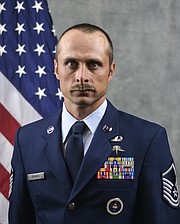Two local veterans share their stories with Valley Press
It is easy for the average non-military person to take for granted the sacrifices military men and women make every day in service of our country.
Often, especially in school, youth are told about what military life is all about from friends, movies and maybe hear from the random elderly community member about the “good ole days.”
In Montana, locals will find that they are lucky to have one of the highest percentages of veterans in the U.S. Learning the stories and about that life is as easy as walking down the street and asking a few questions.
With Veterans Day near, it is a good idea to meet with these locals and hear from them the reasons they served and to thank them for their service.
One of those people is Thompson Falls School Resource Officer Bob Thornhill.
Thornhill meets with youth and the community daily, however few know that he gave so much of his life in service to this country.
After working in a women’s shoe store, Thornhill joined the Army with the idea of it helping him pay for a college education.
But over the years he ended up finding his way into the Army Airborne Rangers. He was one of the guys who provided security to Special Forces, Navy Seals and similar operations. He served more than 25 years and got the opportunity to travel the world.
Throughout this career he would spend very little time at home and had to make many sacrifices for his country. When he ended his military career, he was in logistics and had found his way into being an officer.
Thornhill has been married for 32 years, and his wife is one of the women he met at the shoe store where he worked so long ago.
One of the things Thornhill misses the most is also the main reason he stayed in service for so long: the brotherhood he found.
He, along with many career military members, mentioned having difficulty with traversing the gap into non-military life. That is why so many find themselves working jobs that mitigate that transition as police officers, protection agents, and as in Thornhill’s case, resource officers. He also stays in touch with a wide network of fellow vets to help exist in normal life.
Another local veteran about to make this same transition is a man named Jesse Jermyn. He is married to Charity Jermyn, a teaching aid at Plains Schools.
Jesse found himself in a similar situation as Thornhill and went into the military nearly straight out of high school. Jermyn joined the Air Force and had planned on going in for mechanics. However, he found his calling as a SERE Survival instructor.
Jermyn recounted a story of when he had first heard of the program, and they were looking for instructors. Interested candidates were told they had to do 10 pushups.
But what they were not told was the large time gap that they would have to wait in between each rep during which the candidates were required to hold up. Obviously, very few stuck around.
Jermyn is approaching 20 years on the job. He is also finding the transition to “civilian” life difficult and daunting. The last few months of his service he will be taking a special transition course to help aid in the change. This is a relatively new program. Throughout his career he has traveled extensively, and his family has been in tow as well.
Jermyn talked about moving his wife and kids a few years ahead of his retirement, back to the community he grew up in, out in Plains. He and his wife came to this conclusion in order allow their children to grow in a comfortable and unchanging environment. This is the case with most military families and Jermyn explained that the historical reason, some old timer once told him, possibly comes from the idea of stagnation; the fact that a military force that has groups that stay for too long in an area can become biased and sedentary, possibly even compliant and unambitious.
Jermyn is also finishing a degree in elementary education and feels as though, since his career has mostly revolved around teaching, he may stick with doing the same in civilian life, as a minimum possibly a substitute. One of the main reasons he gave for joining was to achieve some financial independence. He loved his service and does recommend it to anyone interested, however advises that young people visit a base and see the culture firsthand to learn if it is right for them.
He also asks for those interested to talk to veterans and those who have served in the community they live in, and whose mindsets align with their own. He says this because if, say, a person from the country were to ask a veteran from the city, that veteran may have different expectations, disappointments, and takeaways than that of someone who comes from the country as well.
One of the great things about America is the variety of life and the freedom to live those varieties, however that opportunity does not come for free.
This Veterans Day is a good time to find community members who have served, in any capacity, and to thank them for being part of securing those freedoms.



